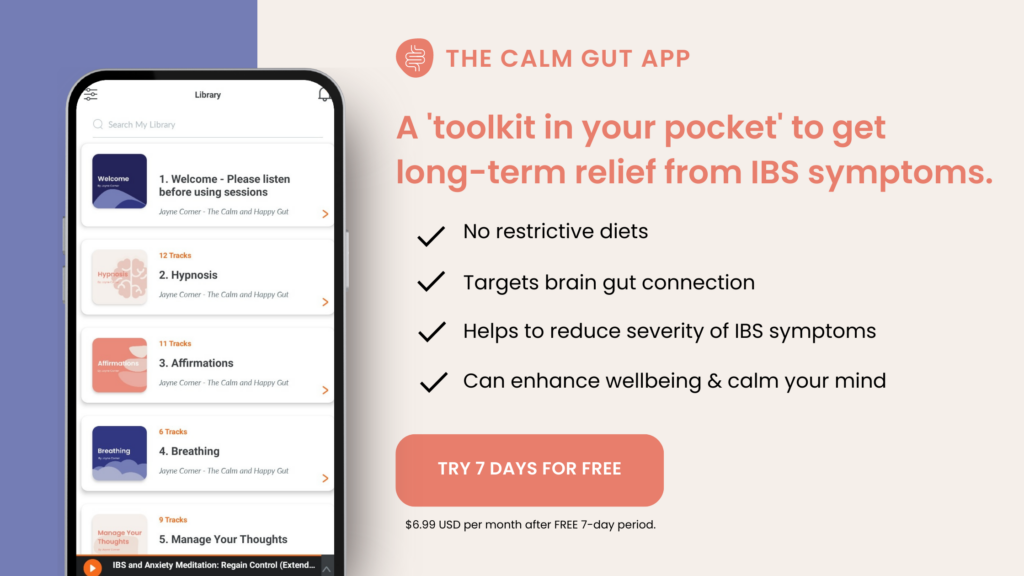In this post I’m going to answering a really popular question, which is: do I think gut directed hypnotherapy or the low fodmap diet works best for managing IBS?
Now, yes I’m a little biased being a psychotherapist, but I’m going to talk you through the research study comparing these two approaches, and share first-hand experiences from my clients who have tried both.
By the end of this post my hope is that you have a good understanding of the pros and cons of each, and which approach may be the right one for you.
So let’s get started.
So in this comparison, I’m going to introduce you to each approach first, before going through their pros and cons, and I’ll start with hypnotherapy.
Using Gut Directed Hypnotherapy to Manage IBS Symptoms
Now I’ve been a gut directed hypnotherapist since 2018, and over that time I’ve been helping IBS clients from all around the world to manage their IBS without having to change their diet or change their eating habits.
So what is gut directed hypnotherapy? It’s a specialised form of hypnosis which is designed to help manage gastrointestinal disorders such as IBS. It’s used because it has the ability to change the signals between your brain and gut, which in the case of IBS just aren’t working as they should. In fact the faulty communication between your brain and gut is what is responsible for the hypersensitivity you are experiencing and the change in bowel movements – which results in either constipation or diarrhea.
A program of gut directed hypnotherapy doesn’t just help with the physical symptoms you may be experiencing such as pain, gas, bloating and altered bowel movements, it also helps to reduce anxiety, reduce your overall stress levels, and helps to change how you think and feel about your IBS. This in turn lowers food anxiety, breaks the stress-symptoms cycle, and helps you take back control of anxiety provoking ‘’what if’’ thoughts which have you always expecting the worst to happen.
Using the Low FODMAP to Manage IBS Symptoms
Now the low fodmap diet on the other hand is a very different approach to managing the symptoms of IBS and is entirely focused on the food that you’re eating. It’s broken into a 3-step process, where the first stage is heavily restrictive, cutting out many different fodmap foods for between 2-6 weeks. The second phase is the reintroduction where you slowly reintroduce different foods over 6 to 8 weeks, and finally there is the personalisation phase where you establish a personalised fodmap diet with the help of a dietician.
The low fodmap diet is designed to be followed temporarily, and helps reduce IBS symptoms because you are eliminating or restricting a group of sugars called fodmaps which can cause intestinal distress. I’m not going to get into why fodmaps can cause IBS symptoms in this post, but all you need to know right now is that when the nerves inside of your gut have become hypersensitive (which happens in the case of IBS) they become hyperreactive – causing bloating, pain and altered bowel movements. So by removing fodmaps from your diet, you’re removing the foods that are causing these nerves to overreact in your gut.
Now following a low fodmap diet usually results in you having a list of foods which are seen as troublesome for you, and which if you cut out or reduce, then your IBS symptoms will also reduce.
The low Fodmap diet can feel as though everything starts and stops on your plate
Unfortunately the low fodmap diet approach can feel as though everything stops and starts on your plate, and doesn’t take into account things like the impact of stress or anxiety on your digestion. There is so much more to digestion than the food you eating. For example, how you feel before, during and after eating can play a big role in how your body digests that food. That’s because if you’re feeling anxious or stressed about your food choices, or about what is going on in your life, then that’s going to have an impact on how your digestive system functions.
This all comes back to your gut-brain connection. And this important. Because if you are in a state of stress, also known as fight or flight, your body starts to divert blood away from your digestive system affecting the muscles in your bowel – causing urgency, spasms or shutting off movement altogether. In state of stress you can also experience increased sensitivity to pain.
This is why following a low fodmap diet can result in many inconsistencies – where you can eat a trigger food one day and be in a world of pain, and then eat it 2 days later and feel ok.
What does the research say?
When looking at these two approaches, they both have the ability to reduce your IBS symptoms. And in a randomised clinical trial, gut directed hypnotherapy was found to be as effective as the low fodmap diet for treating IBS.
This study spilt participants into 3 groups – low fodmap diet, gut directed hypnotherapy and patients doing a combination of both.
In all groups, approximately 70% of patients reported improvements in overall symptoms but interestingly, but not surprisingly the patients in the gut directed hypnotherapy group also reported improvements in symptoms such as anxiety, and depression. What’s also interesting to note is that hypnotherapy outperformed a combination of both therapies together, and outperformed the low fodmap diet alone at the 6 month follow up.
What does this all mean for you? Well it means that it’s possible for you to achieve the same level of symptom reduction without having to change your diet. And in addition to reducing the physical symptoms of IBS, it can also significantly help with psychological factors such as anxiety.
The Pro’s and Con’s of Low Fodmap and Hypnotherapy for IBS
So let’s now look at the pros and cons of each approach.
Pro’s and Con’s of Gut Directed Hypnotherapy
Again, we’ll start with hypnotherapy.
Now I think you may agree with me here that the biggest pro is being able to manage your symptoms long term without having to go through the stress, overwhelm and confusion of changing your diet and following a food plan. There is no complicated food shopping or hours of time preparing meals in advance. Hypnotherapy also helps to reduce or eliminate food anxiety, and rebuilds the trust and confidence in your body which allows you to start saying yes to social events which involve food, and to stop feeling at the mercy of your bowel.
I’ve worked with many clients who have successfully gone back to booking holidays away, taking long car journeys, and eating out in restaurants again without all that old fear and anxiety. In fact the gut hypnotherapy program I take my clients through doesn’t just focus on reducing your symptoms, it also helps you to get back doing all of the things you love.
Now in terms of cons, hypnotherapy is not magic and there is a time and energy commitment needed from you. There are daily self hypnosis support sessions to listen to which are around 20-25 minutes in length, and often I’ll give my clients tasks to do in-between weekly sessions, which include tracking their thoughts and deep breathing exercises.
When it comes to how quickly you can expect results, some people feel significant differences in a very short space of time, whilst for others it can take a bit longer. I’ve worked with clients who after just 3 sessions went from experiencing terror at the thought of eating out to enjoying fish and chips with their friends on the beach with no reaction.
Pro’s and Con’s of Low Fodmap
Ok, so let’s talk about the pros and cons of low fodmap.
The pro is that it can reduce IBS symptoms, and there are many people who see relief and are content to limit what foods they eat.
But let’s be honest, following restrictive diets can be hard.
They can also be expensive especially if you don’t have the time or the knowledge to prepare fodmap free meals. This approach can also be the cause of disordered eating where you become more and more anxious around eating out and around meal times because you have primed yourself to be on the look out for gut symptoms. This means that you may find yourself saying no to weekends away or social events because you aren’t able to control what you can eat. And one of the biggest drawback in my mind is that you don’t deal with those oversensitive nerves and the ongoing anxiety and stress – which can actually cause your stomach to become more and more reactive – meaning overtime your list of ‘’safe’ foods becomes smaller and smaller.
What approach to managing IBS should you take?
So when it comes to you and your IBS symptoms, should you do low fodmap or gut directed hypnotherapy?
Well unfortunately I can’t tell what to do as I would really need to understand your own personal situation, but I would encourage you to consider: your tolerance for restricting foods, your stress levels, and much anxiety is playing in your IBS and in your relationship with food.
Because if you find yourself feeling anxious, or worried around meal times and as though your world is getting smaller and smaller trying to control your eating, then I would be strongly encouraging to explore a program of hypnotherapy.
If you would like to learn more about the The Calm Gut IBS Program and whether this is the right approach for you, then book a free 30 minute online consultation here.

